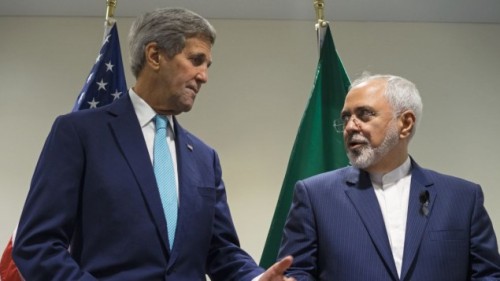PHOTO: US Secretary of State John Kerry and Iranian Foreign Minister Mohammad Javad Zarif
LATEST
- UN Special Rapporteur Criticizes Iran Over Human Rights
- Reformist Politician Given 6-Year Prison Sentence
- Supreme Leader’s Aide Hits Back at Saudi “Terrorism” Allegations
WEDNESDAY FEATURES
Iranian-American Businessman Namazi Reportedly Arrested
Iran Military’s “4-Level Role” to Keep Assad in Power
In an abrupt shift of position, the US is welcoming Iran’s participation in multilateral talks on the Syrian crisis.
Last week, the Moscow-led initiative for discussions was considered by Russian Foreign Minister Sergei Lavrov, US Secretary of State John Kerry, and Turkish and Saudi counterparts in Vienna.
The group announced further consultations for this Friday, but Kerry said that “this is not the right moment” for the involvement of Iran, a key ally with Russia of Syria’s Assad regime.
However, on Tuesday, State Department spokesman John Kirby said the Islamic Republic would be among the countries who hope to agree on a “multilateral framework for a successful political transition in Syria which leads to a government not led by Bashar al-Assad”.
Kirby said the US still opposes Iran’s “destabilizing activities” in Syria, but the Obama Administration “recognized that at some point in the discussion, moving toward a political transition, we have to have a conversation and a dialogue with Iran”.
A Russian-Iranian campaign this summer for high-level talks was blocked by Saudi Arabia in mid-August, which demanded the departure of Assad from power before negotiations developed. Moscow then built up its forces inside Syria and launched a bombing campaign — supporting a six-front ground offensive by the Syrian military, backed by Iranian forces, Hezbollah, and Iraqi militia — for political leverage on the US and other countries.
Washington soon accepted that Assad could stay in power for up to six months as part of a political transition, a position joined by Germany, Britain, and finally Turkey.
However, Saudi Arabia has been more reticent. It has not stated an acceptable time for Assad’s continued rule, and last weekend Foreign Minister Adel al-Jubeir indicated that Iran’s inclusion in talks was unacceptable as Tehran is a supporter of “terrorism” in the region.
Jubeir said on Wednesday, “The view of our partners…was that we should test the intentions of the Iranians and the Russians in arriving at a political solution in Syria, which we all prefer.”
A Russian “diplomatic source” said 10 Foreign Ministers are expected at Friday’s talks, with Russia, the US, Turkey, and Saudi Arabia joined by Britain, Germany, France, Iraq, and Jordan as well as Iran.
UN Special Rapporteur Criticizes Iran Over Human Rights
The UN’s Special Rapporteur on Iran, Ahmed Shaheed, has published a new report criticizing the Islamic Republic over human rights.
Shaheed, who has been the UN’s investigator since June 2011, sets out a record rate of executions, a flawed judiciary, restrictions on freedom of expression, and continued repression of journalists, students, politicans, and dissidents.
Shaheed said in a briefing at the UN, “The human rights situation in the country remains dire”, despite pledges by the Rouhani Government to improve the situation, with a “strong disconnect between the professed policy of engagement and the behavior of authorities on the ground”.
Shaheed has issued five reports since 2011. He has never been allowed by Iranian authorities into the country, relying interviews on telephone and Skype interviews with people inside the Islamic Republic as well as testimony by Iranians abroad, documents, and the submissions of NGOs.
The rapporteur said executions had been rising “at an exponential rate” since 2005, with at least 753 in 2014. They have continued to increase this year, with at least 694 people — including 10 women and one juvenile hanged as of mid-September in the highest rate in 25 years.
Reformist Politician Given 6-Year Prison Sentence
Former MP Esmail Gerami Moghaddam has been sentenced to six years in prison.
The lawyer for Moghaddam, the spokesman for the reformist Etemade Melli party, confirmed that a five-year sentence was imposed for “collusion against the State” after a trial on September 29. An earlier one-year sentence for “propaganda against the State” was also reimposed.
Moghaddam was arrested on July 17 at Imam Khomeini International airport, after returning to Iran upon the completion of his doctoral studies abroad. He had left the Islamic Republic amid the regime’s suppression of dissent after the disputed 2009 Presidential election.
Supreme Leader’s Aide Hits Back at Saudi “Terrorism” Allegations
The Supreme Leader’s top aide, Ali Akbar Velayati, has responded sharply to Saudi allegations of Iranian support of “terrorism”.
Velayati turned the criticism back on Riyadh on Tuesday, “On behalf of the US and West, Saudi Arabia is masterminding and sponsoring terrorism in Muslim countries.”
He cited Saudi-led bombing of Yemen since March, as Riyadh attempts to check the expansion of power by the Ansar Allah (Houthi) movement.
Last weekend, Saudi Foreign Minister Adel al-Jubeir denounced Iran as a destabilizing influence in the Middle East. The Saudis are trying to limit Iran’s involvement in any talks about the Syrian civil war.
Velayati responded, “Saudi Arabia is brazenly and groundlessly interfering in the internal affairs of Arab and neighboring countries in the region, and makes such remarks about the Islamic Republic of Iran’s judicious policies to justify its behavior.”
Tensions between Iran and Saudi Arabia escalated last month after a stampede near Mecca killed many hundreds of pilgrimages, including almost 500 Iranians. The Supreme Leader and President Rouhani denounced Saudi negligence as part of a challenge to Riyadh’s influence in the region. However, the language had eased in the past two weeks until the exchange between Jubeir and Velayati.

